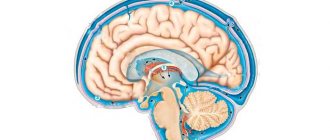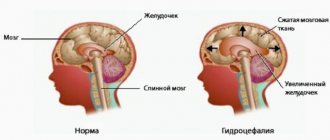Features and classification of the disease
Hydrocephalus is considered a disease called “dropsy of the brain.” The pathology often occurs in newborns, but can also occur in adulthood and implies excessive accumulation of cerebral fluid in the subarachnoid space.
Under the influence of fluid, compression of the brain occurs, which causes neurological pathologies. The main symptoms of hydrocephalus:
- development of strabismus;
- convulsions;
- weakness in the limbs;
- loss of vision;
- gaze paresis.
If the disease progresses, severe neurological changes can lead to decreased mental abilities and death.
Hydrocephalus is divided according to the following characteristics:
- acute, chronic form depending on the course;
- closed and communicating hydrocephalus;
- compensated, decompensated course of the disease;
- external and internal hydrocephalus.
Moderate hydrocephalus in adults occurs with severe symptoms. In parallel, aggressive behavior may develop due to the development of neurasthenia with increased cranial pressure.
How to measure intracranial pressure
Only specialists using special equipment can find out the ICP indicator. The following methods are considered the most accurate:
- Epidural. Hair is removed from the head. A small hole is drilled in the skull and an optical device is inserted there, which transmits information to a monitor or sensor. The procedure is performed under anesthesia and is used in severe cases.
- Measuring ICP using an intraventicular catheter . It is the most progressive and accurate. A catheter with a sensor is inserted through an opening in the skull. The procedure allows you to accurately determine intracranial pressure and pump out excess accumulation of the contents of the box.
- Subdural . A screw is screwed into the skull and a sensor is connected to it. The procedure is rarely used.
These methods are dangerous for the patient; with a slight error they lead to serious consequences, therefore they are used only in difficult situations when the patient is on the verge of life and death. In other cases, non-invasive techniques are used to obtain data on blood flow speed.
- MRI;
- Transcranial Dopplerography;
- Duplex scanning of arteries;
- Fundus examination;
- Otoacoustic method;
- Spinal tap;
- Rheoencephalography.
To obtain a reliable result, several measurement methods are often used.
Hydrocephalus and military service
The diagnosis of hydrocephalus during military service is considered under Article 23. "Disease Schedule". The fitness category is awarded in accordance with the general condition of the patient. If any violations are recorded, the conscript may be released upon fulfilling his army obligations.
You can serve in the army with hydrocephalus if the diagnosis does not affect the functioning of the brain. When the pathology occurs in a compensated form, the clinical picture does not appear, so the assignment of a category largely depends on the examination at the time of passing the medical commission.
In some cases, fluid accumulation may be due to a brain cyst. If such a diagnosis is identified, surgical intervention is recommended, and the conscript receives a temporary deferment until full recovery.
After completing the necessary rehabilitation course, a conscript can theoretically serve in the army, but in practice the military registration and enlistment office does not carry out conscription if such a clinical picture develops.
Category of suitability for brain cysts
Sometimes fluid accumulation occurs due to the appearance of tumors. If the cause of hydrocephalus is brain cysts, then the conscript will not be accepted into the army. First, the young man will receive a deferment and a referral for treatment. Theoretically, if medical intervention proves effective, the cyst will no longer interfere with the movement of cerebrospinal fluid, and the conscript’s health condition stabilizes - the man can be drafted into the army. But, as the practice of the Conscript Assistance Service shows, military registration and enlistment offices usually do not call for service with such a diagnosis.
With respect to you, Vasiliev Egor, lawyer of the Assistance Service for Conscripts.
We help conscripts obtain a military ID legally.
212-639-5935 Call if you have questions about who MSK will share information about you with during your surgery.
Social Work 212-639-7020 Social workers help patients, their families and friends cope with the challenges of cancer. They provide individual counseling and support groups during treatment and can help you communicate with your children and other members of your family. Our social workers can also help refer you to local agencies and programs and provide information about additional financial resources if you are eligible.
Tobacco Treatment Program 212-610-0507 If you want to quit smoking, MSK has specialists who can help. Call for more information.
For more information, use the LIBGUIDES library on the MSK website - https://library. mskcc.org. You can also contact library staff for assistance at 212-639-7439.
External resources
Access-A-Ride web.mta.info/nyct/paratran/guide.htm 877-337-2017 The New York City MTA offers shared rides and assistance for people with disabilities who are unable to ride buses or subways.
Air Charity Network
Provides travel to treatment centers.
American Cancer Society (ACS) www.cancer.org 800-ACS-2345 (800-227-2345) Offers a variety of information and (Hope Lodge) a free place for patients and caregivers to stay on cancer treatment time.
Cancer and Careers website
A one-stop resource for educational materials, tools, and information about activities for working people affected by cancer.
CancerCare www.cancercare.org 800-813-4673 275 Seventh Avenue (between West 25th and 26th Streets) New York, NY 10001 Provides counseling, support groups, educational workshops, publications and financial assistance.
Cancer Support Community
Provides support and educational materials to people facing cancer.
Caregiver Action Network
Provides educational materials and support for those caring for loved ones with chronic illnesses or disabilities.
Corporate Angel Network
Offers free travel for treatment throughout the country using available seats on corporate flights.
Gilda's Club www.gildasclubnyc.org 212-647-9700 A place where men, women and children with cancer receive social and emotional support through fellowship, workshops, lectures and community events.
Good Days Organization
Offers financial assistance to cover co-pays during treatment. Patients must have health insurance, meet certain criteria, and be prescribed medications that are included in the Good Days formulary.
Healthwell Foundation
Provides financial assistance to cover copayments, health insurance premiums, and deductibles for certain drugs and treatments.
Joe's House Organization
Provides cancer patients and their families with a list of places to stay near treatment centers.
LGBT Cancer Project resource
Provides support and advocacy for members of the LGBT community, including online support groups and a clinical trial database that welcomes participation from members of the LGBT community.
LIVESTRONG Fertility Organization
Provides fertility information and support to cancer patients whose treatment involves fertility risks, as well as cancer survivors.
National Cancer Institute www.cancer.gov 800-4-CANCER (800-422-6237)
National Cancer Legal Services Network
Free program to protect the legal interests of cancer patients.
National LGBT Cancer Network
Provides educational materials, training courses and advocacy for LGBT patients, cancer survivors and at-risk patients.
Needy Meds resource
Provides a list of programs that support patients in obtaining generic and brand name medications.
NYRx Organization
Provides prescription drug benefits to current and former New York State employees who meet certain requirements.
Partnership for Prescription Assistance
Helps eligible patients who do not have prescription drug coverage obtain medications at no cost or at low cost.
Patient Access Network Foundation
Provides assistance with copayments for patients with insurance.
Patient Advocate Foundation
Provides access to health care, financial assistance, insurance assistance, job retention assistance, and access to a national directory of resources for the underinsured.
RxHope Organization
Provides assistance to people in obtaining medications for which they may not have enough money.
to come back to the beginning
The call is over. Let's try to sum up some results.
Of the seven conscripts who applied to our organization, five were discharged, two received a deferment.
However, questions remain. Thus, Ch. was discharged under a psychiatric charge, although his neurological disease is fully confirmed by medical documents of the most serious level. The file contains certificates with examination results from the Research Institute of Therapy and the Protopopov Research Institute of Neurology and Psychiatry.
It is characteristic that it is neurological diseases that most often cause controversial assessments and discrepancies in the HVAC and RVC commissions. In the case of Ch., the situation developed as follows: the commission of the RVK of the Leninsky district declared him unfit for military service (SO.7). Diagnosis: consequences of traumatic brain injury, episyndrome, severe liquor-hypertensive syndrome, vegetative-vascular dystonia of the hypertensive type. The diagnosis was made based on the conclusions of two largest research medical institutes in Ukraine. However, the medical commission of the UWC did not agree with the conclusions of the RVC commission and Ch. was granted a deferment to undergo an additional medical examination. At first glance, the decision of the UWC commission seemed completely unmotivated, but, having contacted the regional health department and the head of the medical commission of the UWC, A.M. Miroshnichenko, we learned the “key” to solving the situation: the RVC neuropathologist sent Ch. to the Turboatom medical unit ( neurological department), which is the base for examining conscripts from several districts of Kharkov. In the neurological department, they did not pay attention to the results of previous examinations - computed tomogram, REG, ECHO, EEG and the findings of the Research Institute of Neurology and Psychiatry - and made a diagnosis: vegetative-vascular dystonia of the hypertensive type, but without indicating that there were cranial consequences -brain injury. It was in this department that a conclusion was issued on the state of health of conscript A.Ch., on the basis of which the medical commission of the UWC did not agree with the decision of the medical commission of the RVC of the Leninsky district. Of course, the presence of extracts with the results of examinations carried out in medical research institutes should have alerted the HVAC doctors and, if the examination of the conscript had been carried out more thoroughly, then he could have been commissioned much earlier. In this situation, the state spent much more money than was necessary on examining a obviously sick young man.
The same diagnosis - vegetative-vascular dystonia, indicated as the main one in the report on the state of health of conscript S., allowed the medical commission of the Military Military Commission to recognize him as fit for military service, although he had suffered from infectious-allergic damage to the central nervous system since childhood. And also, as in the previous case, the medical commission of the UWC had a formal reason - the doctors of the same Turboatom medical unit did not pay attention to numerous medical reports and examination results of the leading medical institutions of the city, which made it possible to make an easier diagnosis. And again, the state spends money on repeated examinations of the conscript, although a more thorough examination would have made it possible to determine much earlier that he was sick. And these are no longer problems of military registration and enlistment offices - these are problems of our medicine, its competence and integrity.
Particularly indicative is the case of conscript Sh., who has a peptic ulcer of the stomach and duodenum. The doctor of the 28th city clinical hospital, who filled out a report for the medical commission of the Moscow RVC, ignored the results of the X-ray examination and wrote down the diagnosis - gastroduodenitis.
We still have not received a response to our complaint to the regional health department, and conscript Sh. has been exempted from military service due to another illness.
An extremely disappointing conclusion emerges: the level of examination and competence of medical workers during conscription leaves much to be desired. To whom should society make claims for the fact that it spends huge amounts of money on examination, treatment and commissioning of sick conscripts and military personnel? The leadership of RVC and OVK is responsible for recruiting a sick conscript into the army, but often the information they receive from medical workers of civilian medical institutions does not allow them to draw the right conclusions. We have to admit that our society does not have an instinct for self-defense, because... although not a single member of our society is interested in squandering public funds, and at the same time, through our fault, they are being squandered. We see a solution in an effectively functioning judicial system, which could protect both the conscript and society from incompetence and dishonesty.
Hydrocephalus in children is a brain disease that develops as a result of excessive accumulation of cerebrospinal fluid (CSF) in the ventricles of the brain and/or subarachnoid space. Since the child’s brain continues to form after birth, the development of hydrocephalus can stop this process, leading to serious consequences in the form of retardation in physical and neuropsychic development. Sometimes the consequences of hydrocephalus suffered in childhood accompany a person throughout his life, interfering with a full-fledged existence. Careful observation of the child by a pediatrician and related specialists (in particular a neurologist) makes it possible to timely detect the initial manifestations of hydrocephalus in children and eliminate it.
Syringomyelia and the army
Syringomyelia is a serious disease in which a cavity appears in the spinal cord due to enlargement of the central canal. This pathology is considered chronic and has a slow progression.
Nervous tissue cells (glia) appear in the spinal cord, which disrupt the transmission of nerve impulses to the brain. The disease can be present throughout life and in rare cases cause a bulbar disorder (changes in heart rate, breathing) leading to death.
This disease can progress quickly due to intense physical exertion, therefore, when passing a medical commission, the conscript may be assigned a category of limited fitness or given a complete exemption (category “B”, “D”).
List of necessary studies
To confirm a chronic increase in intracranial pressure, doctors prescribe the following types of examinations: MRI, CT, x-rays, blood and urine tests, ultrasound of cerebral vessels, biopsy.
The last type of research is carried out in order to determine the presence of infectious microorganisms in the cerebrospinal fluid. The presence of pathogenic microflora is considered very dangerous and entails the development of severe complications (encephalitis, cerebral edema, etc.). In this case, the commission does not hire the young man.
In order to measure this indicator, a special needle is inserted into the cranial cavity and connected to a pressure gauge, which shows the result. However, such research is used less and less due to the high risk of harm to human health.
Passing a medical examination
Confirmation of the existing diagnosis is carried out during the passage of a medical commission. The conscript submits all medical reports to the military registration and enlistment office for review. Afterwards, a referral for additional examination is issued.
After receiving the results of the study, the draft commission reviews all the data and makes an appropriate decision on assigning a category of suitability for military service. Hydrocephalus is considered a slowly progressing disease, so the issue of exemption from military obligations may have different opinions.
Symptoms
Clinical manifestations in children of the first years of life before the closure of cranial sutures and overgrowth of the fontanel differ from all other age groups. With an increase in the amount of cerebrospinal fluid and an increase in intracranial pressure in children in the first two years of life, an increase in the size of the head occurs due to the fact that the bones of the skull are loosely fused to each other. The head looks disproportionately large compared to the body. In pediatrics, the norms for the increase in head circumference per month in the first months and years of life are clearly defined. Measuring this indicator monthly allows us to judge the possible onset of hydrocephalus. In addition, with an increase in intracranial pressure, the bulging and pulsation of the large fontanel attracts attention. There may be divergence of cranial sutures, increased patterning, and overflow of extracranial veins with blood, which can be seen when viewed with the naked eye. The brain part of the skull predominates over the facial part. The behavior of children suffers: they are whiny, they are characterized by monotonous crying “on one note”, they are restless, they sleep poorly. When feeding such children, excessive regurgitation is possible. With hydrocephalus, children are delayed in motor development: later they begin to hold their head up, roll over, and sit. With severe hydrocephalus, the formation of these skills does not occur at all, paresis and paralysis develop (decreased muscle strength in the limbs) with an increase in muscle tone. Convulsive syndrome may occur. There is also a lag in neuropsychic development: late smiling, lack of a revival complex in the first months, the child does not follow the toy, humming and subsequent speech are not formed. Intellectual development suffers. Children who have already had fusion of the fontanelles and the cranial sutures are tightly fused have slightly different symptoms. Their head shape is normal, the proportions between the brain and facial skeletons are preserved. Such children complain of intense headaches, more often in the first half of the day, frequent nausea and vomiting, which occur in the absence of errors in nutrition. Spontaneous nosebleeds are possible. Vision suffers: sharpness decreases, double vision appears, signs of congestive optic discs are visible in the fundus. Possible convulsive syndrome with loss of consciousness, unsteadiness when walking and loss of coordination. Such children also lag behind their peers in physical and neuropsychic development. With the long-term existence of hydrocephalus, a decrease in muscle strength and urinary function disorders in the form of urinary incontinence develop.
List of diseases for which they are not accepted into the army
If a conscript has the following diagnoses, then he automatically receives exemption from military service:
- brain dysfunction (trauma, oncology, various disorders);
- mental disorder of an endogenous type (cyclothymia, schizophrenia, chronic delusional state);
- mental disorders due to intoxication of the body (taking psychotropic substances, physiological changes of a somatic nature);
- stress, psychosis, depression;
- infantile personality disorder (nuclear form of psychopathy, obsessive-phobic syndrome);
- mental disorders due to the use of harmful chemicals (drug addiction, substance abuse, severe alcoholism);
- mental fatigue, which has different forms of flow.
Is it possible to serve with high ICP?
If a young man has increased intracranial pressure, he will not be accepted into the army. This is one of the most basic reasons for deferring service, and in some cases the conscript is declared unfit.
To obtain such a certificate, you will need to visit a neurologist from the military commission. Also, against the background of high blood pressure, disorders of the nervous system and brain activity may appear.
- Swelling of the eyelids.
- Drowsiness.
- Visual disorders.
- Lethargy and apathy.
- Dizziness.
- Increased skin sensitivity.
- Memory impairment, absent-mindedness.
When is a deferment due?
In some cases, the medical board doctors prescribe a re-examination after a 6 or 12 month delay. This option will allow you to track the dynamics of varicose veins and determine the young man’s suitability for service.
A deferment from conscription is given if there is a referral for surgery. In this case, its duration will depend on the recovery period. It cannot exceed 1 year.
The type of surgery depends on the course of the disease and the likelihood of complications. If the situation eventually improves, the young man will have to join the army.
Important! The commission's actions can be appealed administratively and judicially. While the case is being investigated, the guy cannot be taken into service.
What are varicose veins
The disease appears due to the loss of elasticity of blood vessels and is characterized by associated symptoms. These include:
- pain in the legs;
- feeling of fatigue and heaviness in the lower extremities;
- the appearance of seizures;
- dilated vessels;
- skin itching;
- swelling.
The main causes of the pathological condition are the following factors:
- heredity;
- regular lifting of weights;
- lack of active loads;
- long standing or sedentary work.
Attention! The risk of developing varicose veins increases with age, but it is increasingly appearing in young people under 30 years of age.
Help
If you are sure that your illness falls under the category of unfitness, and the military medical commission decides that you will have to serve, you need to go to court. Ask questions to our lawyers directly on the website, they will tell you how to draw up a statement, whether the decision is illegal and whether you have the right to challenge it.
Sign up for a free legal consultation
We’ll call you within 5 minutes → We’ll answer your questions → We’ll sign you up for a free consultation (optional)
How we are working
Analysis of the situation
A detailed analysis of the situation that happened
Screening test
Assessing the chances of enlisting in the reserves
Action plan
Drawing up a personal plan for effective action
Full consultation and guidance before receiving a military ID
Epilepsy is considered one of the most complex neurological diseases. This is a condition characterized by convulsive seizures with motor disturbances that are not provoked by immediate factors. Pathology can have different manifestations depending on the site of brain damage and etiology. Whether epilepsy and the army are compatible, the decision of the medical board on this matter depends on the nature of the attacks.
For many years, endocrine diseases have been characteristic of mature and elderly people. Over the past 10 years, the situation has changed dramatically, and pathology of the endocrine system has become common among children and adolescents.
That is why young people of military age have questions about whether they are recruited into the ranks of the armed forces with similar diseases? Conscripts’ doubts are explained by the fact that functional disorders of the thyroid gland negatively affect the functioning of internal organs and systems.
The first thing that worries a conscript when he receives a summons to the military registration and enlistment office is the question of how to pass the commission. For some young people, military service is an important step, while others try to avoid it by any means, collecting certificates about their illnesses. Both the former and the latter are interested in which pathologies are given a deferment or complete exemption. Whether people with diabetes are accepted into the army is one of these questions.
Treatment of intracranial hypertension
High ICP often provokes serious intracranial deviations, so treatment should proceed in a hospital setting with a fairly high intensity. It depends on the mechanisms of development of intracranial hypertension, and can be either conservative or symptomatic. The first option is used if there is no danger to the patient’s life, and consists of symptomatic treatment. The most commonly used are diuretics, which force the removal of fluid from the body.
For benign intracranial hypertension, diuretics are prescribed
If severe hydrocephalus is observed, surgical intervention may be prescribed using various techniques. The operation helps restore normal outflow of cerebrospinal fluid from the subarachnoid space. For neuroinfections, intensive antibacterial therapy is prescribed. If high ICP is caused by tumor processes, high-tech interventions may be prescribed - gamma knife, cyber knife.
If you really want to serve
Despite the widespread belief that conscripts mostly try, there are quite a lot of those who strive to serve in the Armed Forces. And sometimes young men try to hide the fact that they have diabetes from the medical board. It is almost impossible to do this. Military medical experts carefully study not only the documents provided by the young man, but also the results of the tests that must be taken after receiving the summons.
If even the slightest suspicion arises, the conscript will be sent for additional examination. The only thing that can be achieved with a non-insulin-dependent type of disease is to undergo a course of treatment in a hospital. After this, you will have to undergo a medical examination again, and if there is a significant improvement, you can apply for service with restrictions. But this is also quite difficult, because even if the disease is temporary, after a year it can worsen and become more complicated.
Spinal circulatory disorders
In medicine, there are several forms of diseases associated with blood circulation in the spinal cord. These may be the consequences of vascular deformation as a result of compression, squeezing, the consequences of chronic vascular insufficiency; consequences of ischemia (can be persistent or transient), development of aneurysm, vascular malformations, atherosclerosis, existing vascular pathologies. Sometimes the picture of the disease is complicated by other diseases - diabetes mellitus, inflammatory processes, osteochondrosis, the development of tumors and intervertebral disc herniation. Signs of spinal circulation disorders may include pain and numbness in the neck and arms. If vascular dysfunction occurs in the upper part of the body, then weakness of the upper extremities is observed, and if the lower extremities are significantly affected, acute pain in the lumbar region and legs, paralysis of the legs and dysfunction of the pelvic organs are observed. Symptoms develop quickly and go away quickly, but may remain.
The law contains a list of diseases and their consequences, in the presence of which a conscript can receive a military ID without serving, quite legally. However, in practice, we see that the requirements for confirming the disease are quite high, and without preparing the necessary documents, a conscript can undergo the military military examination, be declared fit for service and subsequently be drafted into the army, despite the presence of serious diseases. We strive to help conscripts respect their rights.
Leave a request on our website and receive a free consultation from our specialist on issues of exemption from the army in the presence of vascular diseases of the brain and spinal cord.
How to recognize high ICP?
Intracranial hypertension, as a rule, does not go unnoticed - very characteristic symptoms accompany this condition. Intracranial hypertension can be congenital and acquired, acute and chronic. The most common chronic form of pathology, manifestations of which can be:
- headache of varying intensity, especially severe pain occurs at night and in the morning;
- fainting, increased sweating, surges in blood pressure;
- nausea or vomiting in the morning;
- fatigue uncharacteristic for young people;
- aggressiveness, emotional instability;
- decreased potency/sexual desire.
A regular increase in ICP threatens serious damage to the central nervous system, as well as other disorders - decreased visual/hearing acuity, difficulties with communication, remembering new information, and performing everyday work. If you suspect high ICP, immediate consultation with a specialist - a therapist or neurologist - is necessary.
Which diabetics will definitely not be accepted?
This disease is considered one of the most complex of the endocrine group of pathologies. This is due to the fact that with diabetes there is a high risk of complications and other concomitant pathologies. If there are the following violations, medical military experts will refuse to allow a conscript to serve even in wartime:
- These are angiopathy and neuropathy. Most often, the lower extremities are affected, on which ulcerative formations can appear at the slightest injury.
- Due to damage to the microvasculature (capillaries), the limbs lack oxygen, resulting in ischemia, which leads to gangrene.
- In diabetes, kidney function is impaired, which leads to organ failure. This is fraught with intoxication and serious condition. Nephropathy.
- The retina also reacts to the development of hyperglycemia. At first, vision deteriorates, but in the absence of adequate therapy and compliance with diet and injections, blindness can occur. Retinopathy.
- Since the blood vessels are also affected, the risk of developing diabetic foot is high. In this case, the diabetic is prescribed to wear special shoes, which is impossible in the army.
In addition, according to medical statistics, people suffering from diabetes should control their blood pressure to prevent the development of hypertension.











